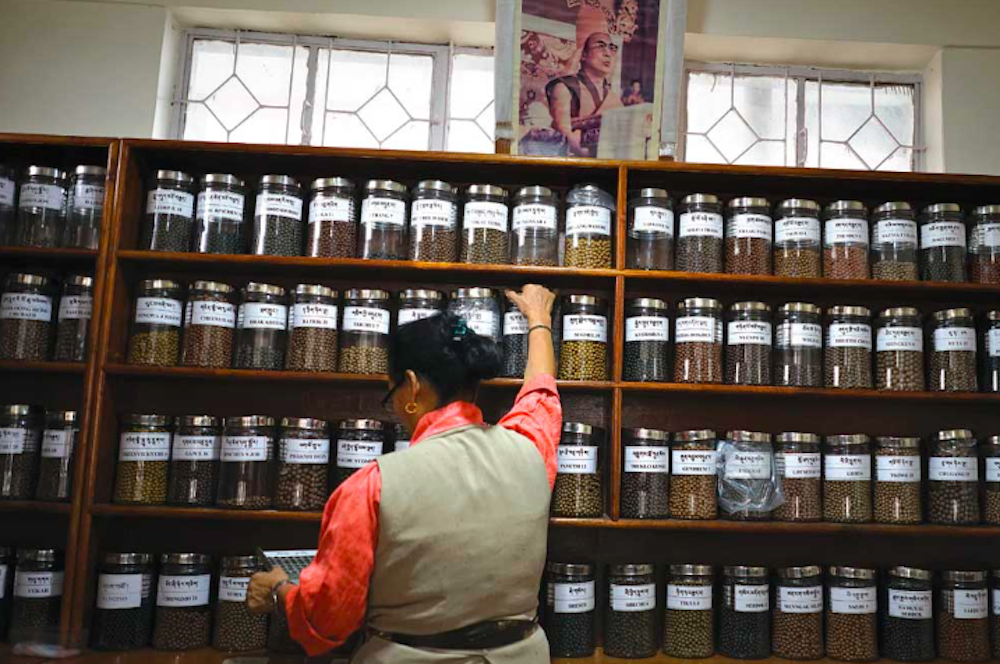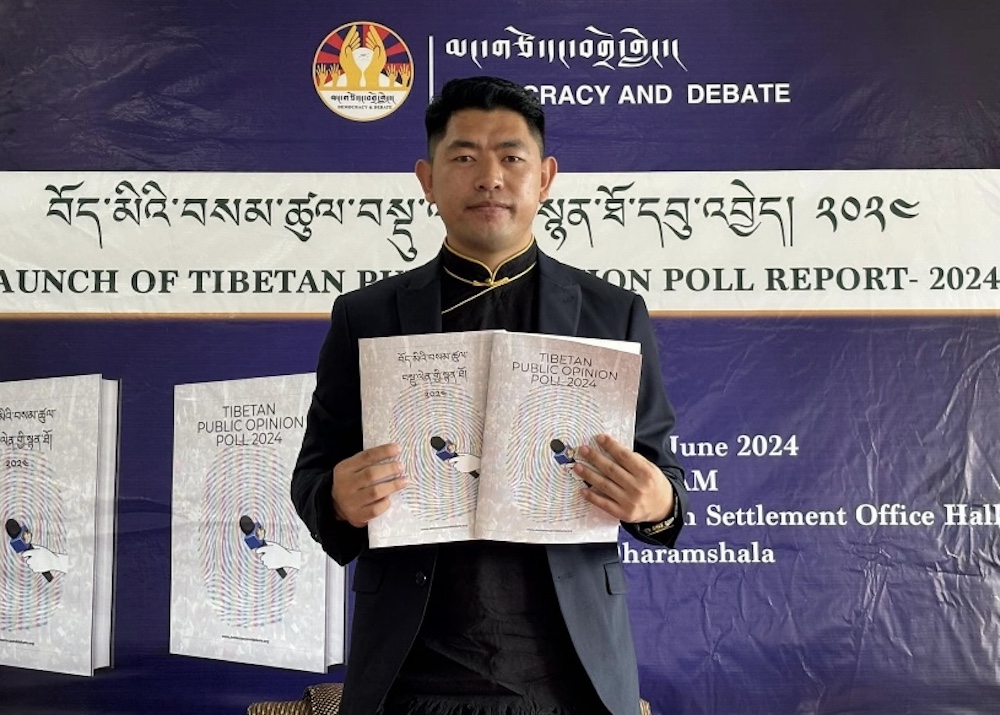By Tenzin Nyidon
DHARAMSHALA, JUNE 26: Men-Tsee-Khang, the foremost Tibetan traditional medical institution celebrated for its enduring practice of traditional Tibetan medicine and astrology, has been a stalwart presence for over six decades in exile. This institution, also known as the Tibetan Medical and Astrological Institute, carries a profound historical legacy, not just for its medical prowess but as an institute which is synonymous with Tibetan identity, scholarship in medicine and ingenuity. In the course of its turbulent political history over the last few decades, that ingenuity has shown through even more.
Despite the perils of exile, rehabilitation of thousands of refugees and insurmountable political challenges, the marquee institution was re-established on March 23, 1961, in the exile capital of Dharamshala under the guidance of His Holiness the 14th Dalai Lama. Initially housing just one doctor, one astrologer, and ten students across two campuses in Dharamshala, the institute embarked on a journey of resilience and dedication. Over the ensuing decades, Men-Tsee-Khang has not only flourished but has also gained global recognition for its unwavering commitment to preserving and promoting the ancient Tibetan system of medicine and astrology, known as Sowa Rigpa.
Despite its century-old medical tradition and noble mission of safeguarding Tibetan cultural heritage, recent developments hint at financial challenges for Men-Tsee-Khang. With a workforce numbering 700-800, including students, the institute is currently grappling with operational and financial liquidity issues, highlighting the need for sustainable support and revamp of its operations.
Institutional revamp
During the incumbent Sikyong Penpa Tsering’s visit to the Nizamuddin branch of Men-Tsee-Khang on January 5, 2023, the pressing financial challenges faced by the institute were addressed. He expressed concern (from 3:18 minutes onwards) about the varying profitability of different branches and low revenue expectations within a few Tibetan settlements. The Sikyong highlighted that the institute has been operating for more than sixty years without fundamental financial regulations. He acknowledged the need for change, emphasizing the importance of establishing clear rules and regulations to prevent a recurrence of a similar financial crisis in the future.
In response to these challenges, a committee was established with the specific mandate to implement the Annual Budget Regulation. The decision to form this governing body was prompted by the recognition that the budgetary control within the institute exposed significant inconsistencies, prompting it to address financial irregularities, enhance fiscal discipline, and ensure effective management of resources at Men-Tsee-Khang.
To further address and manage the institute’s affairs, the 16th Kashag established a governing body, with the Sikyong serving as Chairman, Department of Health Secretary Dawa Tsultrim as Vice Chairman, and Thupten Tsering, the Director of Men-Tsee-Khang, as Member Secretary. Additionally, departmental secretaries and officials from the Tibetan Medicinal and Astro Institute were included. Discussing the Kashag’s plans for Men-Tsee-Khang, the Sikyong emphasised, “What the present Kashag did was, particularly, my personal view is that if you are part of the governing council, you just can’t be sitting there for the sake of it. You should be doing things for the interest of the council.”
He highlighted proactive efforts over the past two years, focusing on developing rights, rules, and regulations for the institute. He said the overall structure of the institute was defined under a set of rules, including a ‘code of conduct’ similar to the Central Tibetan Administration (CTA), with an emphasis on budgetary control, and a rule based promotion and transfer system to foster a structured framework.
He also emphasized that any issues within the institute should be assessed in the context of established rules. If there are shortcomings or areas that need improvement, amendments can be made to ensure that the rules are in tune with the reality of the institute’s operations. This, he said, is a proactive approach aimed to strengthen governance, enhance financial management, and improve overall efficiency within Men-Tsee-Khang.
The Sikyong’s hands-on approach is apparent with the appointment of Thupten Tsering, the Director of Men-Tsee-Khang, a former CTA civil servant, through whom, he has direct link to a position that he sees instrumental in overseeing the institution and possibly implement any minor or major changes that he sees fit under his tutelage as the Chairman of the governing body.
Financial mismanagement?
The financial mismanagement at Men-Tsee-Khang, attributed to the previous administration’s investment in ambitious projects, particularly a substantial concrete building project in Bangalore, with an investment exceeding in crores, has raised concerns about fiscal prudence. The executive head of the Central Tibetan Administration (CTA), Sikyong Penpa Tsering, also the incumbent Health Minister acknowledged the complexity of the issue, told Phayul, “I don’t think it’s the fault of the individual who overtook the leadership, did it in the best interest of the institution. But I have always been saying it’s not the institution that is troublesome. The problem is with structure and the system. When you don’t have structure and system in place then there are events or opportunities for the leadership to take discretionary decisions which are not enshrined in the rules and regulation. All these accumulate over time and then it bursts up eventually.”
He also emphasized the lack of sufficient oversight or supervisors from the governing board played a role in this scenario, allowing for substantial investments in concrete buildings, adding, while such investments may appreciate in value over time, they currently impact liquidity.
He said efforts have been made to address these financial challenges, with some improvements noted. However, the incumbent Health Minister pointed out that a significant aspect of the financial strain came from the practice of hiring contract staff whenever needed, leading to increased operational costs. “The add on staff where they have hired contract staff whenever needed is another main lean down,” he added.
Another contributing factor to the financial challenges at Men-Tsee-Khang is the incurred losses by several clinic branches in different locations, including Chennai, Mysore, Goa, Kerala, Andhra Pradesh, and Mumbai. These setbacks have added to the overall financial strain of the institution.
Recognizing the need for intervention, the Kashag has stepped in to manage the institute, implementing administrative and structural changes. These interventions aim to re-establish financial stability and institute necessary reforms to prevent similar financial issues in the future. The ongoing efforts reflect a commitment to ensuring the institution’s sustainability and preserving its vital role in upholding Tibetan traditions and healthcare practices.
Collateral damages
The restructuring at Men-Tsee-Khang has led to potential collateral damages and unintended consequences. One significant impact is that doctors graduating from Men-Tsee-Khang will no longer be given placements, in a departure from the institution’s practice. Additionally, another unintended consequence involves the non-retention of contract staff. These potentially effective cost cutting measures however, beg questions on the corporate style cutdowns that has little to no regard for affected individuals who have lost their jobs and career opportunities.
In a letter dated October 7, 2022, from the head office of Men-Tsee-Khang outlines two significant policy changes reflecting a shift in the institution’s approach to admissions and employment opportunities. The first policy change emphasizes that student admissions will be based on the availability of vacancies, signaling a departure from a potentially open admissions policy to one that considers the institution’s capacity and available resources.
The second significant policy change pertains to job opportunities for students pursuing education in Tibetan Medicine and Astrology. Under this new policy, students will no longer be guaranteed job opportunities within the institute. The rationale provided is that their primary responsibility is to provide education to students studying these subjects.
The letter notes that, for the batches spanning 2018 to 2020, a notable number of 60 Tibetan medicine students secured employment, while 17 students studying Astrology (from the batches of 2013, 2014, 2018, and 2020) were also employed. However, the letter suggests that this trend may not continue for upcoming batches. The letter further details that the batches of 2020, 2021, 2022, and 2023 have a total of 90 students studying Tibetan Medicine, while the batches of 2011, 2012, and 2013 have 29 students studying Astrology.
A point of concern raised in the letter is the lack of a unanimous decision among the Board Members regarding the adoption of the admission policy. The letter indicates that the change in the admission policy was discussed during the 2012 General Board Meeting but was not strongly emphasized by the Board Members. The absence of a unanimous decision suggests a potential lack of consensus or differing opinions among the Board Members, which could have contributed to the current situation.
With Men-Tsee-Khang, having entered its transition period with staff downsizing and cross-cutting measures, it can be implied that the approach is strategic to address the challenges and reshape the institution but is it principled?
The incumbent Health Minister as well as the Sikyong, in response to the challenge of limited employment opportunities due to the existing space constraints for new doctors, acknowledged the current difficulty in providing more employment within the institute, stating, the available space is already occupied by senior doctors. He suggested an approach- that is encouraging experienced doctors with entrepreneurial skills to consider independent ventures in various cities. While acknowledging the financial challenges associated with starting a clinic, he said, “We are willing to offer support in the form of financial assistance to cover rent payments or deposits. Additionally, the medical institute could supply medicines to these independent clinics. This collaborative effort could facilitate the establishment of new clinics and potentially create more employment opportunities. However, the decision to provide employment within the institution is not entirely ruled out. It depends on the availability of jobs within the existing system and the potential for expansion. If the institution can expand its capacity, there could be more opportunities for employment.”
The Sikyong, in addressing the non-retention of contract staff, opined that a contract is for a specific period, whether it is two, three, or four years. He pointed out that there might be an expectation among some contract workers that their employment would be indefinite and stressed the need for individuals to understand that contractual agreements have a predetermined duration. However, he highlighted the importance of prioritizing the interests of the institution over individual expectations at the moment.
Staff Security Scheme (SSS)
The institution’s significant shortfall is retirement benefits, specifically the absence of the Staff Security Fund (SSS) or Provident Fund), is a critical concern that has repercussions for both current and future employees. The Staff Security Scheme (SSS) is a financial arrangement typically established by employers to assist employees in saving for their retirement, playing a crucial role in ensuring long-term financial security. It enables employees to accumulate savings throughout their working years, providing a resource they can access upon retirement.
The institution is facing a notable shortfall in retirement benefits, particularly with the absence of the fund. The lack of the SSS has raised concerns among stakeholders, potentially impacting the institution’s overall reputation, particularly in terms of how it treats its employees. Many say, this deficiency may dissuade potential candidates from considering employment within the institution, and it leaves retired employees potentially vulnerable.
In addressing this matter with Phayul, an employee from Men-Tsee-Khang, who opted to remain anonymous, expressed that the institution has managed to extend the SSS benefits to all its current retired employees. However, the real concern lies in how the institution plans to extend these benefits to future retirees, especially in the event of a substantial number of employees retiring simultaneously. The absence of the SSS for current employees may present challenges in ensuring that sufficient funds are available to meet the institution’s future retirement obligations.
Men-Tsee-Khang, while facing financial challenges, undergoes a transformative phase through restructuring and governance reforms. The commitment to preserving Tibetan traditions remains steadfast, necessitating a delicate balance between financial prudence, institutional sustainability, and the well-being of its workforce. The journey ahead requires principled decision-making and strategic interventions to secure the institution’s legacy and contributions to Tibetan culture and healthcare practices.
Thupten Tsering, the Director of Men-Tsee-Khang, addressed the financial strain the institute has experienced over the years during the 63rd anniversary of its reestablishment in Dharamshala. (from 19:50 min.) He noted that the institute incurred losses during the 2020-21 and 2021-22 fiscal years, but reported a profit of around 20 million in the 2022-23 fiscal year stating, “For a time, Men-Tsee-Khang faced financial problems. In the fiscal year of 2021-22 and 2020-21, we incurred significant losses. Given the gravity of the situation, the institute received immediate assistance. However, in the 2022-23 fiscal year, the institute achieved a profit of around 20 million.” Tsering expressed optimism for an improved financial situation in the coming years.
The institution faced a significant shortfall in retirement benefits, particularly due to the absence of the fund. Thupten Tsering, in his speech marking the 63rd founding year of Men-Tsee-Khang, (from 20:25 min) acknowledged the use of the SSS, stating, “50% of the fund has been returned to the staff’s accounts during the fiscal year of 2020-23 when the institute made profits. However, the institute still owes 140 million to the SSS.” Tsering expressed optimism about repaying this amount within two years, provided the institute achieves profits in the 2023-24 fiscal year similar to those in 2022-23.
The underbelly
Faced with a financial strain over recent years, Men-Tsee-Khang has implemented several cost-cutting measures to address its financial challenges. One significant step has been the removal of over 30 contract staff who were daily wage workers, a daily wager who wished to remain anonymous source told Phayul. Within the workforce of the institute, there are over 100 daily wagers who play an integral role in the operations, particularly the physical labor aspect, by producing over 170 different medicines. These workers earn a daily wage of Rs. 875 per day, amounting approximately Rs. 20,000 INR per month.
The daily workers form an integral part of the machinery in terms of the productivity of the institution. They form the major chunk of the work force that are directly involved in the production of the medicines.
However, these daily workers lack benefits, healthcare and a system for redressal and grievances. A source told Phayul on the condition of anonymity that during the previous administration, there was a women empowerment cell that provided Rs. 5,000 INR for three months to two pregnant women, but this cell was dissolved by the previous administration and no longer exists. Similarly, a redressal and grievances system established during the previous administration was also dissolved by the current administration, leaving the workers without any formal mechanism to address their concerns. The current administration under the new top management is also oblivious to their plight as there are no redressal systems currently in place for the daily wage workers, in addition to no health care benefits or other benefits apart from their wages.
One of the daily wage workers, who had been with the institute for over 12 years before recently resigning, said she has “no regrets” about leaving. She felt that the institute “doesn’t really value or even care about them” and realised she would never become “permanent staff in the long run,” having “lost all hope” during her service there.
The concern is that these measures are designed primarily to benefit the institution itself, rather than considering the well-being of the workers, particularly the most dis-possessed. The implication is that decisions should account for the interests and concerns of all parties involved, not just the institution’s priorities. The expressed concerns focus on whether Men-Tsee-Khang’s strategic decisions are principled, equitable, and considerate of the interests of all stakeholders.
While the current management may be ticking off its list to bring the institution to a more financially stable outfit, the method of its operation is susceptible to questions of whether the institution that is built upon the core foundation to serve people has employed ruthless corporate style cut downs and aggressive roll back of operations of the former management, along the way.
Note: Over the course of 6 months, Phayul has repeatedly requested the Director of Men-Tsee-Khang Thupten Tsering for interviews to cross verify the claims and arguments that are posed in this story. Phayul’s platform for Men-Tsee-Khang management through its Director to present its side of the arguments and claims were not responded, despite repeated requests over the phone and in person.









